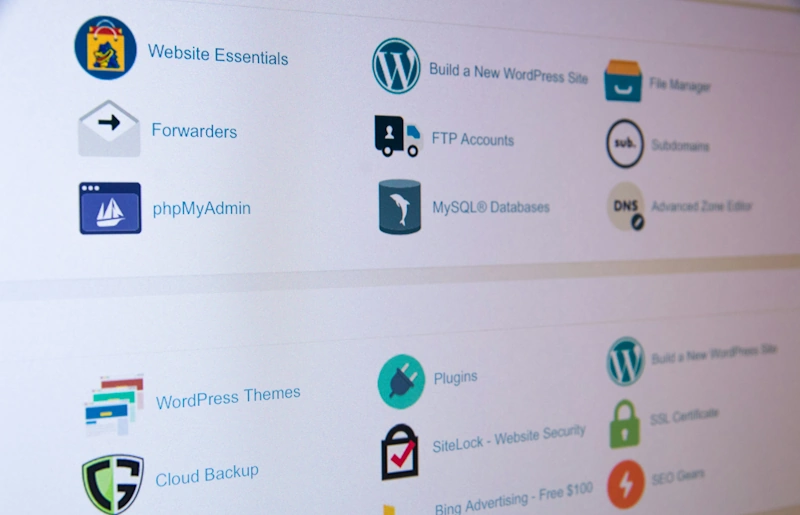What is hosting?
Website hosting is a service that ensures that your website is visible on the Internet. When you build a website, it contains files such as HTML, CSS, images and other media. These files need to be stored somewhere for people to visit your website. This is where hosting comes in. Hosting providers offer space on their servers to store your website files and make them accessible via the Internet.
What is website hosting?
Website hosting is een dienst die je website toegankelijk maakt op het internet. Hostingproviders bieden ruimte op hun servers aan voor jouw websitebestanden. Verschillende soorten hosting zijn shared, VPS, dedicated en cloud hosting. Je hebt hosting nodig om een live website te hebben die mensen kunnen bezoeken. De kosten van hosting variëren op basis van het type en de functies.
There are several types of hosting available, each with its own advantages and disadvantages. Choosing the right type of hosting depends on the needs of your Web site, such as expected traffic and resources needed. In the following sections, we will discuss in more detail the different types of hosting and how they work.
What types of hosting are available?
There are different types of website hosting available, each designed to meet the needs of different types of websites and budgets. Here are the most common types:
Free web hosting
Free web hosting is an option for beginners who want to launch their first website at no cost. This hosting is usually offered by companies that place advertising space on your site to generate revenue. While free hosting can be attractive, it often comes with limitations such as limited storage space, bandwidth and often unreliable uptime.
Shared web hosting
Shared web hosting is a popular and affordable option for small websites and blogs. With shared hosting, multiple websites share the same server and resources, such as CPU and RAM. This makes it cheaper, but can also lead to slower load times and less reliability if other websites on the same server have high traffic.
VPS hosting
VPS (Virtual Private Server) hosting offers a middle ground between shared and dedicated hosting. With VPS hosting, you still share a server with other websites, but you have your own shielded section with dedicated resources. This offers more control and better performance than shared hosting, which is ideal for growing websites that need more resources.
Dedicated hosting
Dedicated hosting means you have an entire server to yourself. This offers maximum control, performance and security, but also comes with a higher price tag. Dedicated hosting is suitable for large websites with high traffic and businesses that require specific server configurations.
Cloud hosting
Cloud hosting maakt gebruik van meerdere servers om een website te hosten, wat zorgt voor hoge betrouwbaarheid en schaalbaarheid. Bij cloud hosting wordt je website niet beperkt door de capaciteit van één server; in plaats daarvan kan het gebruikmaken van de gecombineerde kracht van meerdere servers. Dit maakt het ideaal voor websites met variërend verkeer en bedrijven die maximale uptime nodig hebben.
With these different options, you can choose the hosting that best suits the needs of your Web site. It is important to consider the pros and cons of each type before making a decision.
When do I need hosting?
You need website hosting as soon as you want to launch a website accessible to people on the Internet. Here are some situations in which you need hosting:
- Starting a blog or personal website: Als je een blog wilt beginnen of een persoonlijke website wilt maken om je portfolio, hobby’s of interesses te delen, heb je hosting nodig om je inhoud online te zetten.
- Company or e-commerce site: Businesses need hosting to make their products, services and information available to customers. A reliable hosting service is crucial for e-commerce sites, where customers need to be able to browse and make purchases without interruptions.
- Professional presence: Zelfs kleine bedrijven en freelancers hebben een professionele online aanwezigheid nodig. Een eigen website met een professioneel ogend domein geeft je geloofwaardigheid en helpt potentiële klanten je te vinden.
- Projects and events: Temporary projects, campaigns and events can benefit from their own website to provide information and engage participants.
- Educational and informational websites: Schools, nonprofit organizations and community groups often need a Web site to share information, engage members and promote events.
When choosing hosting, consider the specifications and needs of your Web site. For a simple blog, you may have enough with shared hosting, while a growing business with high traffic may need VPS or dedicated hosting.
How does web hosting work?
Web hosting works by storing your website files on a server and making them accessible via the Internet. Here are the basic steps of how web hosting works:
- Upload files: Wanneer je een website maakt, creëer je bestanden zoals HTML, CSS, afbeeldingen en scripts. Deze bestanden moeten worden geüpload naar een server van een hostingprovider.
- DNS configuration: When someone enters your domain name, the Domain Name System (DNS) translates that name to the IP address of the server where your Web site is stored. This ensures that visitors are directed to the correct server.
- Server response: De server ontvangt het verzoek van de bezoeker en stuurt de nodige bestanden (zoals webpagina’s en afbeeldingen) terug naar de browser van de gebruiker.
- Browser displays the site: The user's browser interprets the files and displays the Web site as designed.
Web hosting providers offer several tools and features to make this process easier, such as:
- Control panel: A user-friendly interface such as cPanel or Plesk that allows you to manage your hosting account and website files.
- FTP access: File Transfer Protocol (FTP) makes it easy to upload files to and from the server.
- Email hosting: Many hosting providers offer e-mail services, so you can set up e-mail addresses associated with your domain name.
- Security: Hosting providers offer security features such as SSL certificates and firewall protection to protect your website from attacks.
Understanding how web hosting works will help you make better decisions about which hosting service is best for your website.
What do domains have to do with web hosting?
Domains and web hosting work together to make sure your website is accessible to visitors. Here's how they work together:
- Domain name registration: A domain name is the address that people enter into their browser to visit your website (e.g. www.yourwebsite.com). Domain names must be registered through a domain registrar. This process ensures that your unique domain name is assigned to you.
- DNS settings: The Domain Name System (DNS) translates your domain name to an IP address that corresponds to the server where your Web site is hosted. This process ensures that visitors are directed to the correct server when they enter your domain name.
- Linking domain to hosting: Once you have registered a domain name and chosen a hosting provider, you need to link the domain name to your hosting account. You do this by configuring the DNS settings at your domain registrar to point to your hosting provider's servers.
- Email hosting: Many hosting providers also offer e-mail hosting, which means you can create professional e-mail addresses associated with your domain name (e.g. info@yourwebsite.com).
By properly configuring your domain name and web hosting, you ensure that visitors can easily find and visit your website. This is a crucial part of establishing a professional and accessible online presence.
What kind of web hosting suits you?
Choosing the right type of web hosting depends on your specific needs and the purpose of your Web site. Here are some considerations to help determine which hosting option is best for you:
- Beginners and small blogs: If you are just starting out or have a small personal blog, shared web hosting is often sufficient. It is affordable and easy to use, but keep in mind that you are sharing server resources with other websites.
- Growing websites: For websites that get more traffic or run heavier applications, such as e-commerce sites, VPS hosting is a good choice. This gives you more control and dedicated resources without the cost of a dedicated server.
- Large companies and high-traffic websites: If you have a large website with many visitors or need specific server configurations, dedicated hosting is the best option. This offers maximum performance, reliability and security, but at a higher price.
- Scalability and reliability: Cloud hosting is ideal for websites that need high reliability and scalability. It uses multiple servers to ensure that your website is always online and can respond quickly to traffic increases.
- Small budgets: Free web hosting can be an option if you have a very limited budget and are willing to accept some drawbacks, such as ads and limited support.
Each hosting option has its own advantages and disadvantages, so it is important to carefully evaluate your current and future needs before making a choice. By choosing the right hosting, you can ensure that your Web site is reliable, fast and secure.
How do I choose the best web hosting?
Choosing the best web hosting provider can be a challenge, but by considering some important factors, you can make an informed decision. Here are some considerations to help you choose the best web hosting:
Domain names
Controleer of de hostingprovider ook domeinnaamregistratie aanbiedt en of ze een gratis domein aanbieden bij hun hostingpakketten. Dit kan het proces van het opzetten van je website eenvoudiger maken, omdat alles bij één provider is geregeld.
Many hosting providers offer e-mail hosting, allowing you to set up professional e-mail addresses associated with your domain name. Check storage limits and the number of e-mail addresses you can create.
Uptime
The uptime of a hosting provider is crucial to the reliability of your Web site. Look for a provider that offers an uptime guarantee of at least 99.9%. This means that your Web site will almost always be available to visitors.
Scalability
Choose a hosting provider that offers scalable options. This means you can easily upgrade to a better hosting package if your website grows and needs more resources.
Control panel
A user-friendly control panel, such as cPanel or Plesk, makes managing your hosting account and website much easier. It allows you to easily upload files, set up e-mail addresses, and perform other administrative tasks.
Technical Support
Good technical support is essential. Look for a hosting provider that offers 24/7 support through various channels, such as chat, email and phone. This ensures that you can always get help if you experience problems with your website.
Security
Security is an important aspect of web hosting. Choose a provider that offers SSL certificates, firewall protection and other security features to protect your Web site from attacks and malware.
By considering these factors, you can choose a hosting provider that is reliable, user-friendly, secure, and meets the needs of your website.
What does hosting cost?
De kosten van webhosting kunnen sterk variëren afhankelijk van het type hosting en de specificaties die je nodig hebt. Hier is een overzicht van de typische kosten voor verschillende soorten hosting:
- Free web hosting: This is usually free, but comes with many limitations, such as ads, limited storage and bandwidth, and minimal support.
- Shared web hosting: Dit is de meest betaalbare optie, met prijzen variërend van ongeveer €2 tot €10 per maand. Dit is geschikt voor kleine websites en blogs met beperkt verkeer.
- VPS hosting: De kosten van VPS-hosting liggen doorgaans tussen €20 en €100 per maand, afhankelijk van de hoeveelheid resources die je nodig hebt. Dit is een goede optie voor middelgrote websites die meer controle en betere prestaties nodig hebben.
- Dedicated hosting: Dedicated servers zijn duurder, met prijzen variërend van €80 tot enkele honderden euro’s per maand. Dit type hosting is geschikt voor grote websites en bedrijven die maximale controle, beveiliging en prestaties nodig hebben.
- Cloud hosting: Cloud hosting is flexibel en de kosten variëren op basis van gebruik. De prijzen beginnen meestal rond de €10 per maand, maar kunnen hoger zijn afhankelijk van het verkeer en de resources die je website nodig heeft.
When choosing a hosting plan, it is important to consider not only the cost, but also the value you get for your money. Cheap hosting may be attractive, but it can result in slow load times, poor support and more downtime. Invest in a reliable hosting provider that meets your website's needs and offers the best performance.





